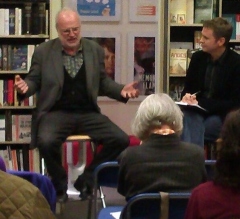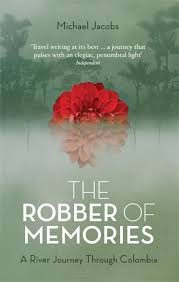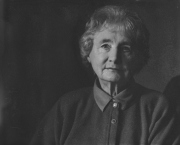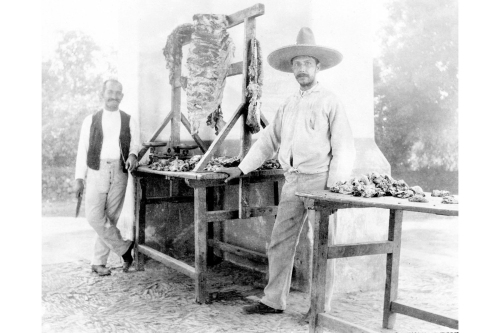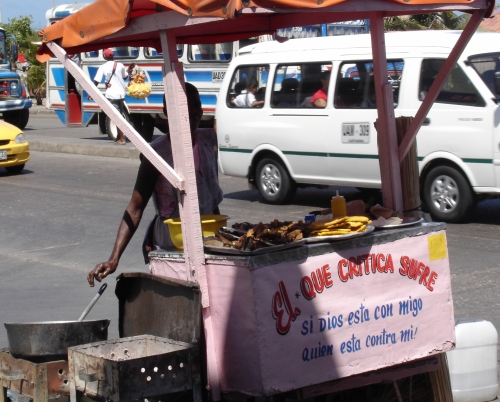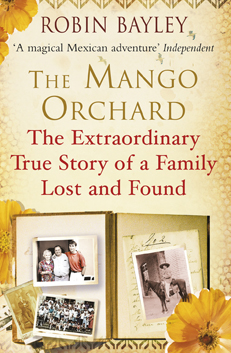The Oaxaca Times recently asked if they could reprint the article I wrote for Traveller magazine last year to coincide with the release of the English language release of The Mango Orchard in Mexico, and seeing as it’s pertinent to today’s date, I thought I’d post it here:
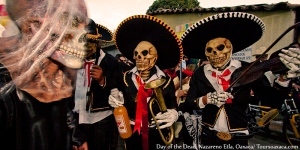
I arrived in Oaxaca in the half light of an early April morning. Still stiff from my journey, I stretched out on a bench outside the bus Central and watched an old man walk by, bent double with the weight of the basket of pineapples he was carrying on his back. Small clouds of dust rose from his every sandaled step, as though his feet were disturbing spirits desperate to be released from the earth. I arrived in Oaxaca shattered and broken hearted; damaged after a thirty hour bus journey, away from Juanita, the Guatemalan girl with whom I saw my future, in pursuit of the ghosts of my past.
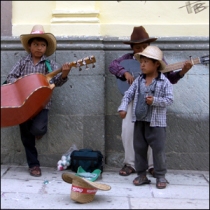
Even years later, I cannot fully explain what compelled me to make the decision to leave Juanita and follow in my great grandfather’s footsteps through Mexico. It certainly didn’t make any sense to me that morning; I was too exhausted and bereft of understanding to appreciate being anywhere.
En route to my hotel I passed a cemetery, its giant tomb stones like a skyline of gothic skyscrapers. Even at that early hour, I saw people replacing flowers and dusting headstones. It seemed fitting to begin my Mexican adventures in a town famed for its celebration of the departed; a place where the past is not so distant from the present.
I slept until mid-afternoon, when I was woken by an earth tremor. There was something ghostly about the low groaning rumble from beneath the surface of the earth. In my sleep-hazed state I wondered if Juanita was sending me messages through the elements. Or if someone else was.
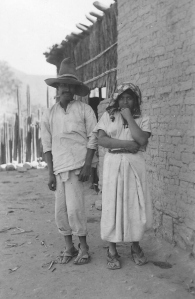
One of my great grandfather’s photos from Oaxaca
Rubbing the sleep from my eyes, I opened my bedroom window on to a meadow of roasting roofs and domed towers glinting in the sun. There was hardly any breeze and the heat of the afternoon had the hue and unhurriedness of treacle. There was something both unsettling and reassuring about being woken from a heavy sleep to find the wakeful world not so different from the one I had just left.
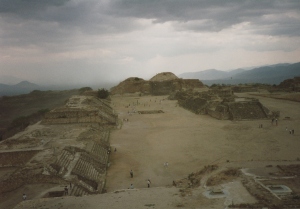
A Storm Brewing over Monte Alban
I spent a couple of days visiting Mitla and then Monte Albán, the ancient capital of the Zapotec people, for which Oaxaca is rightly famed. These were both places that I knew my great grandfather had visited. His sepia photographs of the head scarfed women standing in front of Mitla’s mosaics had helped to colour my boyhood image of Mexico. I felt no trace of his presence though. The closest I came to a spiritual encounter was a fierce storm that whipped up such whirlwinds of dust and grit in the causeways in between the Monte Albán pyramids, the staff had to close the site several hours early.
The next day I visited several of the 17th century baroque churches left by the Spanish. The air was infused with incense, cool and dark; the bright sunshine filtered by blue stained glass and weak candle light reflected in gold leaf. For all their grandeur however, I found the churches more impressive than beautiful, and more awe inspiring than nourishing for the soul.
My search to discover my great grandfather’s secrets had so far led me to tombs and temples which failed to move me. I needed to try a different tack, or abandon my quest and return to Juanita. The next morning, remembering my favourite travellers’ maxim, if you don’t have a map you can never get lost, I left my guidebook at the hotel and set out into Oaxaca once more.
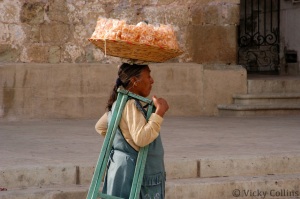
Opposite the hotel a Jacaranda tree had carpeted the street with purple. Whistling and kicking his way through the blossom confetti was a man carrying a tray of cigarettes and two flasks of coffee. I reckoned that anyone with anything to sell would gravitate to where people communed, so followed him down high-walled side streets, flowers reaching across telegraph wires like bunting, and on to wider avenidas. I noticed a man with armfuls of washing up brushes and another weighed down with eggs whisks, oven gloves and several dozen boxes of women’s tights, and another pushing a wheelbarrow full of popcorn. All were heading in the same direction. They crossed a small patch of wasteland and weaved their way through a collection of VW colectivo minibuses that were gathered like cows congregated in the corner of a field. Beyond was a tianguis, an unofficial market in which people displayed their random wares on plastic sheets: second hand self-help books, plastic guns, bird cages, coat hangers, car batteries, spanners, keep fit videos and painted replicas of the Virgin of Guadalupe, and the Seven Dwarves.
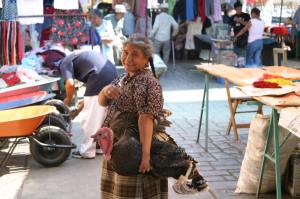
The tianguis morphed imperceptibly into an official market, goods arranged on wooden stalls: net curtains, carpets, clothing, machetes, penknives and kitchen utensils, computer games and pirated DVDs, tethered goats and boxes of frogs.
On I walked, to the in-door market, housed in a giant tram shed of a building. I was greeted with the smell of roasting meat and powdered spices, shouts of pasele, pasele, the rhythmic smack of the butchers’ cleaver, competing mariachi bands and a display of watermelon sliced open, the blood red flesh crawling with bees. Beyond it were brightly illuminated pyramids of passion fruit, mangos, prickly pears and kumquats.
Children in school uniform sat on the stall steps doing their homework with satchels at their feet, or spooned their lunches from plastic containers as their parents negotiated over their heads.
I took a seat at a food stand in the heart of the market, run by a thick set woman with ruddy features who stirred a vat of black mole with a wooden spoon the size of an oar. She passed me my order of quesadillas, which I ate happily listening to her sing along with a lone mariachi strumming his round-backed guitar. The lyrics to their melancholic song cautioned a lover not to go back, but to follow his dreams. Sitting there in this cathedral to daily life, I knew that my Mexican adventures were only just beginning.
Read Full Post »
